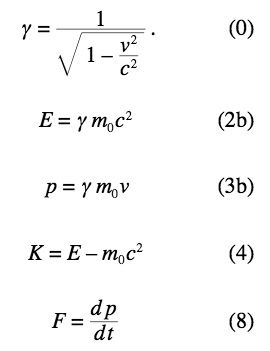GoHeelsWeeeehoooo wrote:i didn't mean for this thread to start any arguments...
Ah, don't worry, it's just four cosmologists discussing the universe and coming up with five (hundred) theories. Bound to happen. Not your fault. Did you get an answer to your first question you understand?
The answer to your second is: depends on how precise your measuring kit is, but I recall in physics that relativistic effects weren't normally considered until 10% - 30% of the speed of light. However, we can tell that satellite clocks run faster than clocks on Earth, but only with super-accurate atomic clocks. It's important for the GPS system.
Cham wrote:Sorry, there's some confusion here. Photons DO have kinetic energy : K = h f, where "f" is the frequency and "h" is Planck's constant. However, The relativistic Newton equation do not apply to them as photons do not have an intrinsic mass.
OK, I'm rusty on the ol' physics, but I think the energy of photons is not kinetic energy. Kinetic energy is related to transfering energy into something to make it move. As far as I can see (maybe I'm blind!
Cham wrote:The only error is the interpretation of m_0. It isn't "Mass initial of something". It's the "proper mass", "true mass", "intrinsic mass" of the particle.
'Rest mass' is a term I remember being used, but I read in another relativity debate that someone claimed the term has fallen from grace on the grounds it was confusing and that there should be only one type of mass, no matter how fast particles went. I'm not sure why. The way I see it is that the mass of a stationary electron is due to some energy bound up in this particle that is neither what we conventionally call kinetic or potential, or even electrical. I've seen this 'rest mass' called 'frozen energy' and maybe what's happened is that more familar types of energy are converted into something we just historically experience as 'mass'. Perhaps for the electron, this 'frozen' energy is related to the electron's spin? *
When you accelerate an electron, it gets heavier because the kinetic energy weighs something, and that appears to make the electron heavier.
Cham wrote:Also, the explanation about photon interferences isn't valid, because electrons can interfere too (because of quantum mechanics), and yet they aren't "everywhere at the same time because of their absence of mass".
OK, I threw this in (ooh, ooh, another of those physics debates!
I'm still not sure what can make me decide whether that's 'right' or 'wrong.' It's one of the few combinations of relativity with quantum mechanics I've heard of, and since it can't be the case that both theories are true, it might be a clue about the nature of the universe beyond these theories.
At least what about this: cheekily, I point out that we can only observe the electron interference pattern via photons, and electrons can only interact with each other by exchanging photons, and they already know what them electrons done before they done it.
d.m.falk wrote:I think alot of the misconception about the status of photonic mass is due to the scientific reluctance to say that Einstein's Theory of Special Relativity is incorrect on the matter.
It's good to be sceptical of Einstein's theories of relativity, even to try disproving them. It's the thing he wanted most...
d.m.falk wrote:But photons do have mass, with its observable effects- ...
Cham wrote:Photon don't have a mass. But it has energy and momentum ! We CAN have energy without mass !
What is mass, really ? m = E/c^2 ? ...
Hmmm, so one of you's wrong? After many years of reading the same ol' "E = mc?? means that a given mass m converts into energy E," I wonder if popular explanations have got it back to front. I think what this equation really means is that all energy weighs something: m = E/c??.
It's the energy of the photon that has mass.
In turn, this mass distorts spacetime.
Spiff.
* I'm really guessing here!


